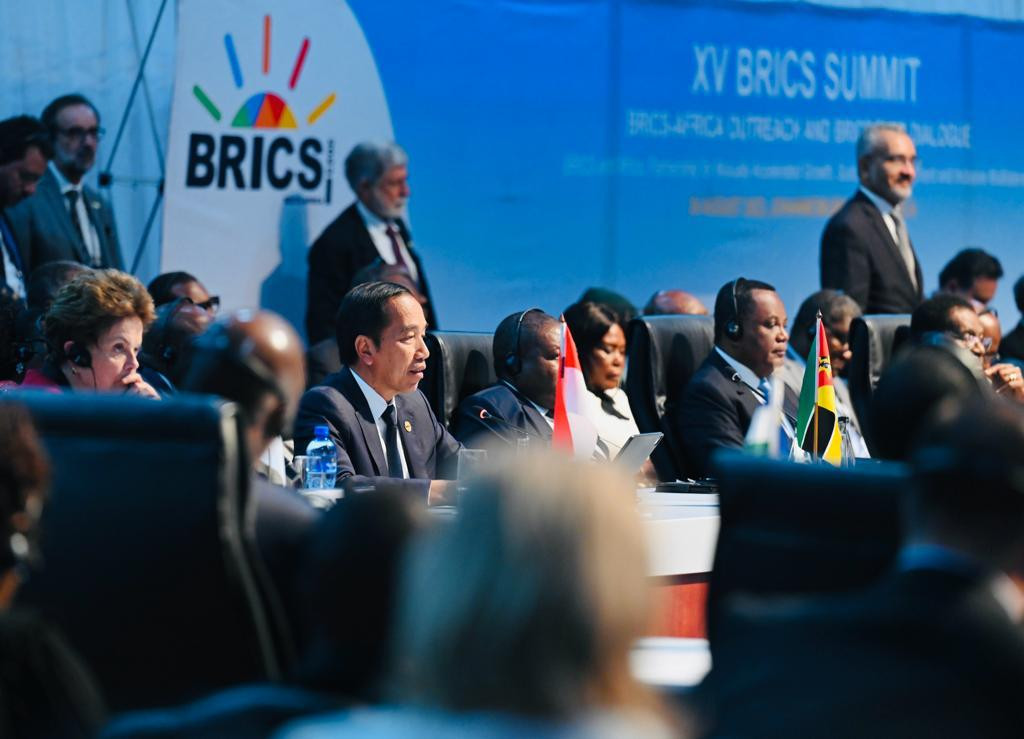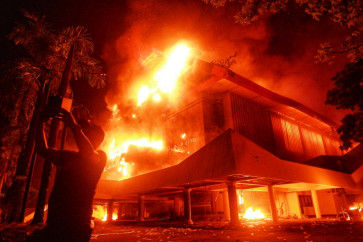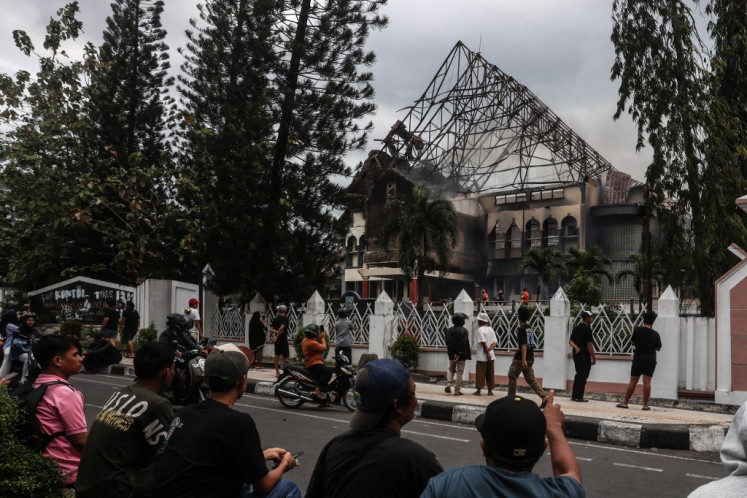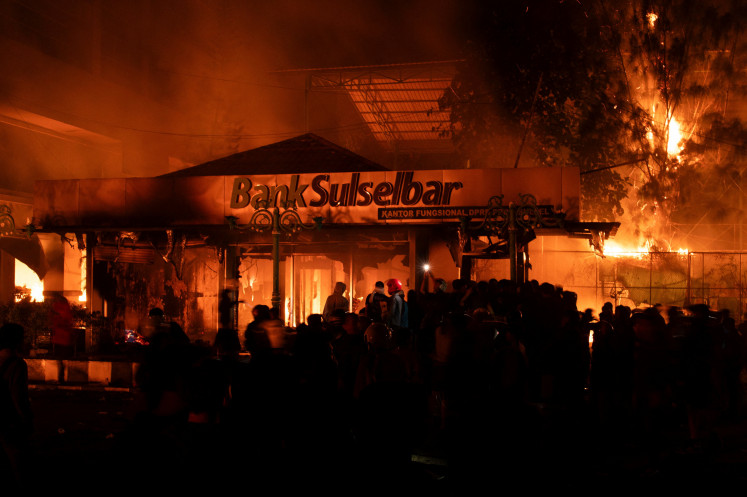Popular Reads
Top Results
Can't find what you're looking for?
View all search resultsPopular Reads
Top Results
Can't find what you're looking for?
View all search resultsJokowi calls for unity in Global South development
The message at the summit in Johannesburg appeared to encapsulate President Joko "Jokowi" Widodo’s growing frustration with Western partners like the European Union, which has attempted to block Indonesia’s downstreaming of its critical minerals sector by dragging it to the World Trade Organization (WTO).
Change text size
Gift Premium Articles
to Anyone
P
resident Joko “Jokowi” Widodo has made a resounding call to unite and reject any effort to obstruct the progress of development in the Global South, while skirting around the conspicuous absence of Indonesia from the expansion of a loose association of countries intent on rebalancing a world order dominated by the affluent Global North.
At a session of the BRICS Plus Dialogue held in South Africa on Thursday, Jokowi called on fellow emerging economies to fight for the right to developmental justice.
“We have all witnessed the injustice of the current world economic order,” the President asserted, according to a readout of his speech received by The Jakarta Post.
“We must reject trade discrimination. Industrial downstreaming must not be hindered. We must all continue to voice equal and inclusive cooperation.”
The message at the summit in Johannesburg appeared to encapsulate Jokowi’s growing frustration with Western partners like the European Union, which has attempted to block Indonesia’s downstreaming of its critical minerals sector by dragging it to the World Trade Organization (WTO).
BRICS itself is a bloc of loosely associated economic powers comprising Brazil, Russia, India, China and South Africa, which has pledged to support the developing world and offer an alternative to the world order dominated by wealthy Western nations.
Read also: BRICS entails opportunities, risks for Indonesia
Having positioned itself as a champion of the Global South and a counterweight to the Group of Seven industrialized economies, BRICS admitted six new member states in the hope of upending the prevailing status quo.
But Indonesia’s exclusion from the list of new recruits elicited a mixed response from foreign-policy circles, even as Jokowi argued that admission into BRICS was never the top priority of his maiden Africa visit.
“To apply for membership you have to show an expression of interest, and we have yet to send the letter,” Jokowi said during a press briefing prior to departing to Indonesia.
The President attended the summit at the invitation of bloc chair South Africa, as Indonesia is this year’s chair of ASEAN.
He insisted that Indonesia would not rush such a decision, even though it maintained good ties with all BRICS states.
Jodi Mahardi, a spokesperson for the Office of the Coordinating Maritime and Investment Affairs Minister, told The Jakarta Post on Friday that the idea for Indonesia to join BRICS “came about from internal discussions and recommendations from economists who see the potential and role that Indonesia has at the global level.”
Bloc membership was one of the topics of the 15th BRICS Summit, and on Thursday the group agreed to admit Saudi Arabia, Iran, Ethiopia, Egypt, Argentina and the United Arab Emirates, its first expansion in 13 years.
Not concrete enough
Jokowi’s assertion had served to dispel any speculation that Indonesia was keen to join BRICS, even as it received various nods from world leaders and geopolitical analysts.
Some have interpreted the move as Indonesia still being on the fence about BRICS, particularly as the bloc has displayed little concrete cooperation among its members.
Centre for International and Strategic Studies (CSIS) international relations researcher Andrew Mantong insists there was no missed opportunity because the bloc was still struggling internally to set up clear group objectives.
He said while BRICS countries already had a shared commitment to reform the current world order, which they deem to be unfair and unequal, they had not come up with any practical means by which the group could challenge it.
“I think it is reasonable for Indonesia to decide to not join BRICS yet,” Andrew told the Post on Friday.
Read also: Jokowi reignites ‘Bandung Spirit’ in week-long Africa tour
Riza Noer Arfani, an international relations expert at Gadjah Mada University, said Indonesia was seemingly more focused on acceding to the Organization for Economic Cooperation and Development (OECD), another grouping which sets out clear policy parameters for membership.
“The OECD is an older organization and offers more tangible outcomes for countries like Indonesia that are seeking to graduate from being a developing country and seeking to escape the middle-income trap,” Riza said on Friday.
The OECD is a forum of 38 self-described democracies with market-based economies, which discusses and coordinates policies among its members. The organization set up its first Southeast Asia office in Jakarta in 2015.
Jokowi expressed Indonesia’s interest in joining earlier this month, when an OECD delegation visited him at the Presidential Palace.
Besides the lack of practicality, Riza also said that BRICS was a “vocal” group that was going against the world order. As such, joining it would put the perception of Indonesia as a relatively neutral country operating a “free and active” foreign policy at risk.
Meanwhile, others like Dinna Prapto Raharjo, the founder of the Synergy Policies think tank, argued that Indonesia should have been more decisive about joining BRICS when it had the opportunity, as it would have helped Indonesia’s economic agenda in the short term.
Read also: Indonesia may need to ‘tread lightly’ with BRICS interest
She noted that BRICS member states are all commodity-exporting countries like Indonesia, while the governance for commodity exports is largely under the control of more advanced Western countries.
“Indonesia cannot negotiate on a stronger footing with the West without solid cooperation with BRICS countries,” Dinna said on Friday.
She said that BRICS had also been looking for solutions to unilateral economic sanctions, which she argued actually hurt ordinary people in the supply chain of developing nations rather than the intended targets, the political elites. (yve)










